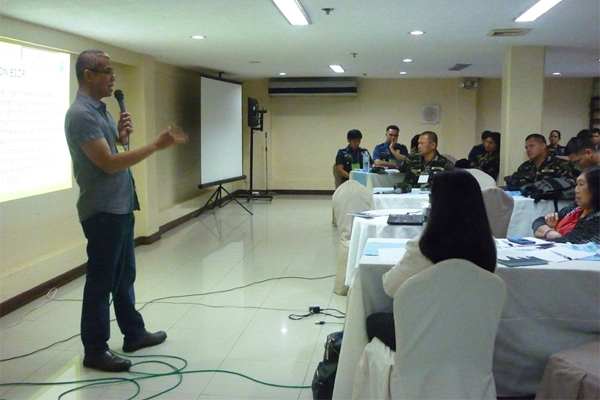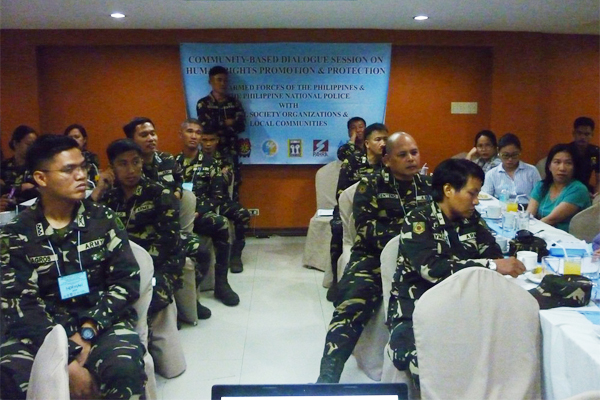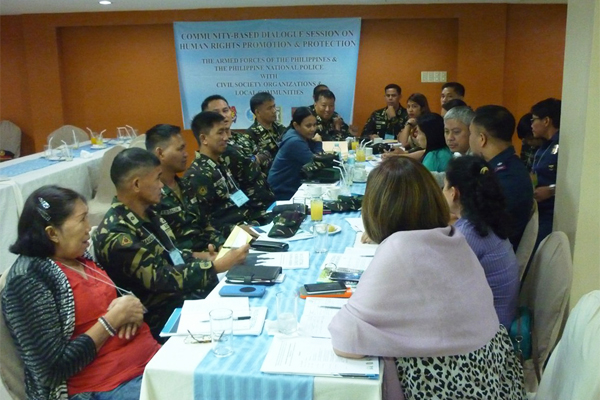Community-based Dialogues (CBD) Project
CBD Regional Institutionalization-Localization Workshop Held

HSF
The purpose of the project is the enhancement of the relationship between the Armed Forces of the Philippines (AFP) and Philippine National Police (PNP), on one hand, and local communities and civil society organizations (CSOs), on the other hand, in the common effort to promote human rights. The specific objective is to help create venues for the AFP and PNP, through their respective human rights offices, and CSOs to collectively discuss human rights promotion and protection, and how cooperative efforts for ongoing and future actions along this line can be maximized.
After eight (8) years of implementation, the project shall continue its framework and essential components, but with a renewed strategic direction that is envisioned to sustain its gains, and achieve the goal of institutionalizing the project especially at the local level. Over the years, significant improvements in the relationship between CSOs/local communities and the security forces have been noted. The respective human rights offices of the AFP and the PNP (from the headquarters down to the units on the ground) have been actively engaged in collaborative efforts with CSOs and government agencies, even as they play their important role with respect to their direct constituents – the police and military officers (ALG, 2016).

HSF
For the period 2017-2019, the project acknowledges that while the human rights situation has generally improved specifically in terms of civil and political rights, there are still a number of social justice and human rights issues that are left unresolved particularly in the area of economic, social and cultural rights (ESCR). For this next phase, the project shall harness the partnership among the AFP, PNP, and civil society that has been built through years of dialogue and cooperation. In view of the urgent need to address conflicts concerning ESCR, and with improved relationships between the security forces and civilian communities, and with local cooperative mechanisms in place (i.e., CBD), the dialogues are expected to deepen, and result in actual resolution of issues, as far as understanding ESCR and the roles of the police and military personnel in ESCR-related conflicts are concerned.

HSF
The first activity in “North Mindanao” was highly successful with 55 participants attending from both regions including Marawi City, Lanao del Sur and Police Regional Office XI, representing the AFP, PNP, CSOs, CHR and relevant government agencies (Department of the Interior and Local Government/DILG, National Economic and Development Authority/NEDA), as well as members of the Project Steering Committee (PSC) and training team. The participants expressed appreciation for the opportunity to have an open and cordial dialogue with critical stakeholders in pursuit of addressing ESCR-related concerns.
Among the key outputs were a discussion and identification of major issues and concerns on human rights promotion and protection and a presentation of the human rights programs of the AFP, PNP and CHR with focus on ESCR, as well as a presentation and discussion of the roles of the AFP and PNP Human Rights Offices, and CHR Regional Offices toward institutionalizing the CBD mechanism at the local level. The participants, grouped by region, held a planning session and presented their next steps moving forward. Core groups were identified for coordination, monitoring and reporting of local multi-sectoral efforts.
